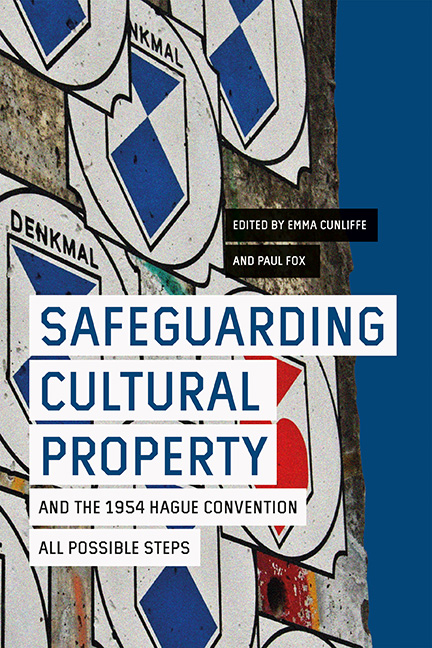Book contents
- Frontmatter
- Contents
- List of Illustrations
- List of Contributors
- Plate Section
- Acknowledgements
- List of Abbreviations
- Preface: The Blue Shield and the Protection of the World's Cultural Property – Preparing in Peace for Conflict
- Part I Safeguarding – Reassessing the Field
- Part II Historical Perspectives
- Part III Current Issues in Legal Implementation
- Part IV The Hague Convention in Practice Today: Tools and Approaches
- Appendix 1 The Hague Convention for the Protection of Cultural Property in the Event of Armed Conflict with Regulations for the Execution of the Convention 1954
- Appendix 2 Regulations for the Execution of the Convention for the Protection of Cultural Property in the Event of Armed Conflict
- Appendix 3 Resolutions of the 1954 Hague Conference
- Appendix 4 Second Protocol to the Hague Convention of 1954 for the Protection of Cultural Property in the Event of Armed Conflict 1999
- Appendix 5 Additional Protocols (1977) to the Geneva Conventions (1949) (Extracts)
- Index
- HERITAGE MATTERS
10 - International Heritage Interventions as No Substitute for Capable State Party Heritage Institutions: The Case of the Carabinieri TPC Intervention in the 2003 Iraq War
Published online by Cambridge University Press: 26 May 2022
- Frontmatter
- Contents
- List of Illustrations
- List of Contributors
- Plate Section
- Acknowledgements
- List of Abbreviations
- Preface: The Blue Shield and the Protection of the World's Cultural Property – Preparing in Peace for Conflict
- Part I Safeguarding – Reassessing the Field
- Part II Historical Perspectives
- Part III Current Issues in Legal Implementation
- Part IV The Hague Convention in Practice Today: Tools and Approaches
- Appendix 1 The Hague Convention for the Protection of Cultural Property in the Event of Armed Conflict with Regulations for the Execution of the Convention 1954
- Appendix 2 Regulations for the Execution of the Convention for the Protection of Cultural Property in the Event of Armed Conflict
- Appendix 3 Resolutions of the 1954 Hague Conference
- Appendix 4 Second Protocol to the Hague Convention of 1954 for the Protection of Cultural Property in the Event of Armed Conflict 1999
- Appendix 5 Additional Protocols (1977) to the Geneva Conventions (1949) (Extracts)
- Index
- HERITAGE MATTERS
Summary
The 1954 Hague Convention for the Protection of Cultural Property in the Event of Armed Conflict (‘the Convention’) and its two Protocols (1954, 1999) has aided in the development of customary international law against looting cultural property (CP) at source. However, in many cases, CP protection (CPP) in conflict zones – high-risk areas – often assumes the form of reactive first aid international heritage interventions, which are, by nature, ineffective at realising the aspiration to proactive protection central to the Convention, including measures to suppress looting and international trafficking, implemented by the responsible competent authorities. This article will consider the Carabinieri Tutela Patrimonio Culturale (TPC)'s international intervention to enhance in situ Iraqi CPP measures during the stabilisation phase of the 2003 Iraqi conflict, in support of the State Board of Antiquities and Heritage (SBAH), following the Iraqi State's inability to introduce effective measures during peacetime and to implement them before hostilities began. Using the TPC's involvement in the stabilisation phase of the Iraqi conflict, with emphasis on their direct cooperation with the civilian authorities to combat looting and trafficking, this article will demonstrate how, in this particular case, such reactive international support during the stabilisation phase cannot be relied upon to secure effective CPP. This article will suggest that due to the inherent instability of the conditions in which the TPC worked in Iraq, such a mission to boost safeguarding measures, including documentation, capacity building and surveillance, was severely limited and inevitably could not provide effective CPP. Sufficient capabilities in the form of human and financial resources simply were not allocated to the relevant civilian authorities (the Iraqi Ministry of Culture and the SBAH), to allow for effective CPP measures to be enacted prior to the US invasion in March 2003. This absence of allocated resources remains the situation today; for the Ministry of Culture and the SBAH to be able to function according to the Convention, they require far greater resources.
THE 1954 HAGUE CONVENTION AND ITS TWO PROTOCOLS
According to Losson (2016, 484), the risks to heritage in times of conflict are many: destruction (intentional [targeting] or as collateral damage); diversion of resources and of media attention as research and conservation projects are abandoned; and looting and trafficking as a consequence of the collapse of institutions in charge of its preservation.
- Type
- Chapter
- Information
- Safeguarding Cultural Property and the 1954 Hague ConventionAll Possible Steps, pp. 169 - 180Publisher: Boydell & BrewerPrint publication year: 2022



